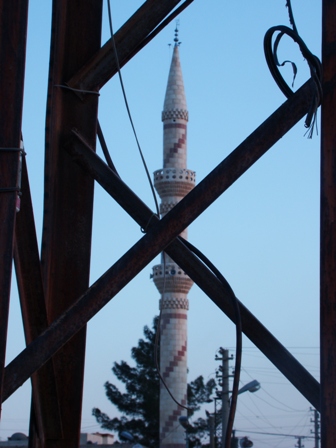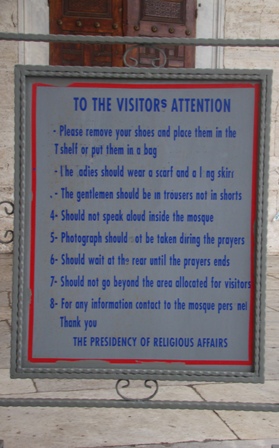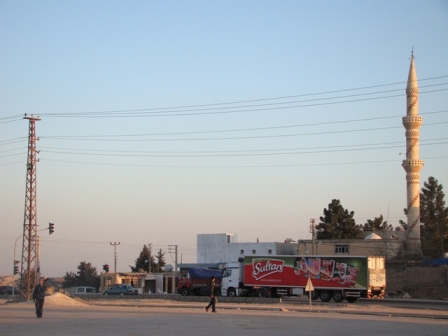 Turkey is a land of many lands. A checkpoint, a bridge between the East and the West used by many cultures and civilizations across the history of humankind. In many ways, however, the country is not only divided by the classical dichotomy between Europe and Asia, as it is a nation made up of many different groups, clans and tribes. It is difficult to accept that those living in Bodrum along the Mediterranean beaches are from the same country as those living in the deserted Diyarbakir; and it would be hard to argue that those living in the orthodox Kayseri are the same culture as those in modern Istanbul. Colloquially one could say that Turkey suffers from an identity problem. This has been seen as an obstacle for the government, obsessed with standardizing religion so as to moderate extremist clans that have an unfavourable view in Europe. To unite people under the giant Turkish state, the government has spread the same flag over the whole country, trying to make it present in every village, town or major city. But far from making one single body of Anatolian citizens, the red fabric painted with a star and a moon all abroad the country only denounces the paradox of Turkish society in religious affairs.
Turkey is a land of many lands. A checkpoint, a bridge between the East and the West used by many cultures and civilizations across the history of humankind. In many ways, however, the country is not only divided by the classical dichotomy between Europe and Asia, as it is a nation made up of many different groups, clans and tribes. It is difficult to accept that those living in Bodrum along the Mediterranean beaches are from the same country as those living in the deserted Diyarbakir; and it would be hard to argue that those living in the orthodox Kayseri are the same culture as those in modern Istanbul. Colloquially one could say that Turkey suffers from an identity problem. This has been seen as an obstacle for the government, obsessed with standardizing religion so as to moderate extremist clans that have an unfavourable view in Europe. To unite people under the giant Turkish state, the government has spread the same flag over the whole country, trying to make it present in every village, town or major city. But far from making one single body of Anatolian citizens, the red fabric painted with a star and a moon all abroad the country only denounces the paradox of Turkish society in religious affairs.
We will be publishing a series of reports related to freedom on Turkish lands and minds. For more information or if you want to help us continue our work contact us at wlworld@hush.com or on Twitter @wikileaks_world.
PART 1, RELIGIOUS FREEDOM AND EQUALITY
“Turkey's reputation as a moderate, tolerant, and secular country is due in large measure to the oppressive and authoritarian manner in which the State monitors and controls religion” (05ANKARA6106).

Allowing rare exceptions, almost everyone in Turkey considers themselves a Muslim. According to U.S. diplomacy (2005), around 98% of the Turkish population are Muslims. This , however, is shallow information, as it is necessary to totally review the concept of ‘being a Muslim’ to understand specific ‘Turkish Islamism"’. While Istanbul, Ankara and Izmir are somewhat liberal cities, outside these big centers most people practice Islam in the traditional way. The general conclusion is that although the state tries to gather Muslims in Turkey into a single body, there are several differentiated sects and tribes of them in the country.
Religious structure was established in the 1924 Constitution, after the liberal revolution guided by the national hero Ataturk installed an ideological secular state, formally known in Turkey as Kemalism. The Kemalist doctrine proposes equality regarding the relationship between the state and religious sects. Apart from the possible benefits, it still implies the end of the traditional Muslim society (where each religious sect enjoyed a degree of autonomy, with their own leadership, collecting their own taxes and living according to their own system. In an attempt to implement this new social order, the Directorate for Religious Affairs (Diyanet) was created "to execute the works concerning the beliefs, worship, and ethics of Islam, enlighten the public about their religion, and administer the sacred worshipping places".
With these actions the Turkish government is essentially trying to reconstruct and portray Turkey as a moderate Islamic society:
“Turkey has the reputation of being the home of "moderate Islam" because it combines a "secular" political system with a tolerant strand of Sunni Islam (…) The majority of Turks subscribe to the Hanafi school of Sunni Islam. The Hanafi school is one of the more open-minded and tolerant strands of Sunni Islam.” (05ANKARA6106)
 Standardization, however, is never without resistance. In this case, the problem is that Diyanet is always seen as adjacent to the Sunni majority, the religious majority in the country and currently in power. It is obvious that the Sunni Shafi'i and the Alevi sects do not have the same support by the state as the dominant Sunni Hanafi. This works in the same way as the Armenian Greagorians, Roman Catholics, Syriac Orthodox, Chaldean Catholics, Greek Orthodox, Bulgarian Orthodoxes, Georgian Orthodoxes and Protestants , all of which are also neglected by the government. Cables 05ANKARA1511, 05ANKARA1935 and 05ADANA191 detail the Christian persecution in Turkey, especially in the South, performed by the Directorate for Religious Affairs (Diyanet). To solve this bad reputation Diyanet has been designing “outreach programs”, aimed specifically towards certain religious groups so as to integrate or model them after what they believe will serve the nation.
Standardization, however, is never without resistance. In this case, the problem is that Diyanet is always seen as adjacent to the Sunni majority, the religious majority in the country and currently in power. It is obvious that the Sunni Shafi'i and the Alevi sects do not have the same support by the state as the dominant Sunni Hanafi. This works in the same way as the Armenian Greagorians, Roman Catholics, Syriac Orthodox, Chaldean Catholics, Greek Orthodox, Bulgarian Orthodoxes, Georgian Orthodoxes and Protestants , all of which are also neglected by the government. Cables 05ANKARA1511, 05ANKARA1935 and 05ADANA191 detail the Christian persecution in Turkey, especially in the South, performed by the Directorate for Religious Affairs (Diyanet). To solve this bad reputation Diyanet has been designing “outreach programs”, aimed specifically towards certain religious groups so as to integrate or model them after what they believe will serve the nation.
"State funds are used to construct mosques, but the state spends no money on Alevi houses of worship, Jewish synagogues, or Christian churches. All Muslim school age students are required to take classes in the Hanafi-Sunni tradition of Islam, regardless of their personal sectarian beliefs. Non-Muslim students are not required to take these courses, but alternative courses are not offered by the state. Private religious classes are illegal and proselytizing by non-Muslims, while not illegal, is viewed with great suspicion and actively discouraged”. (05ANKARA6106).
For a more specific example, Cable 07ANKARA747, describes the attempt made by Diyanet to reach out to the important Alevi group: “Diyanet Foreign Relations Vice Chair Mehmet Gormez recently told us that the Diyanet is increasing its outreach efforts to Alevis to dispel the notion that the Diyanet is an exclusively Sunni organization”.
“The new programs include more in-depth training on Alevism for Sunni religious officials, government sponsored trips to Europe for Alevi religious leaders to support Alevi education and plans to publish a definitive Alevi history.This attempt, however, has been carried out for the wrong reasons, according to Alevi organizations. They have accused Diyanet of being “authoritative” and “insincere” in its actions. For example, Pir Sultan Abdal Alevi Association President Kazim Genc said that “Diyanet remains an exclusive, discriminatory Sunni organization. The Diyanet employs only Sunnis, and only meets with Alevi groups that share its views”
Many leaders have also pointed out that these “outreach plans” are merely carried out to please the European Union in their demand for equality towards Alevis, and a general feeling of failure and resentment is present:
“Many of Turkey's Alevis have long found it offensive that the GOT does not recognize them as a distinct relgious group or allow them to freely practice their religion (...) Alevis want the government to treat Alevism equally in public school religion courses and in the allocation of public funds for the construction and administration of cem houses.”
The headscarf polemic
In April 2007, military intervened to prevent the election as president of Abdullah Gul, a person whose wife wore the headscarf. The banning of the headscarf has always been a strong symbol of the secular state established by Ataturk's revolution. In the end, Abdullah won the presidential elections and in 2008 the AKP, led by him, in partnership with the MHP - Nationalist Movement Party -, passed a law allowing the wearing of headscarves in universities. Turkey's chief prosecutor, Abdurrahman Yalçınkaya, asked the Constitutional Court to close the AKP - Justice and Development Party - with accusations of 'anti-laicistic activities'. The case was concluded on 30 July 2008 with the judgment that the AKP had been at the centre of activities violating secularism. After deliberating for three months, Constitutional Court decided not to close the party, but the AKP was deprived of half of the grant provided by the Treasury.
Regarding this matter, a cable from 2008 classified by Ambassor Ross Wilson points out that Endorgan "allowed himself to be goaded by the National Action Party (MHP) into putting the headscarf ban at the head of the reform queue. For this short-term populist win, he sacrificed a larger constitutional reform package that would have significantly strengthened Turkey's democracy. (...) These and other missteps exacerbated fears among many that Erdogan was going too far, too fast; that there were no effective constraints on the AKP (especially after the military's botched intervention last spring); and that fundamentalists might soon dominate the bureaucracy, judiciary, universities, etc., to change Turkey in dangerous and permanent ways". (08ANKARA691).
Control for political objectives
 The crusade for control over religion for political purposes has turned the supposed free, secular Turkish state into one that “actively monitors and represses religious expression ( …). The Turkish state hires and trains all religious officials (imams and muftis); appoints them to their posts; and pays their salaries. The state writes the sermons that most of the imams deliver at Friday prayers; picks which imam in each mosque gets to deliver the Friday sermon; and uses undercover intelligence officials to monitor their activities.”. (05ANKARA6106).
The crusade for control over religion for political purposes has turned the supposed free, secular Turkish state into one that “actively monitors and represses religious expression ( …). The Turkish state hires and trains all religious officials (imams and muftis); appoints them to their posts; and pays their salaries. The state writes the sermons that most of the imams deliver at Friday prayers; picks which imam in each mosque gets to deliver the Friday sermon; and uses undercover intelligence officials to monitor their activities.”. (05ANKARA6106).
These actions are opposed to the ideals of the 1924 revolution of a secular and fair state. They seem to follow the political will to adapt Turkey to western standards as a part of the project of joining the E.U. This has forced the leading party, the AKP to adopt insincere behaviors regarding its objectives and legality. Although known as a religiously oriented party and supporting religion in the ways we exposed above, the AKP is officially and publicly a secular party, since Turkish constitution and party law bans parties formed around sectarianism, ethnicity or regionalism. On this subject 05ANKARA6106 states that: “nonetheless, AKP is an Islam-oriented political party. The leaders and grassroots members of AKP largely come from the Refah and Fazilet parties, banned for Islamic extremism in 1998 and 2001 respectively” (...) “A variety of Embassy contacts assert that AKP's senior leadership does not really believe in religious tolerance, but merely pretends to support tolerance in an effort to court Western favor and promote Turkey's EU membership bid”.
In cable 04ANKARA7211, the crude political ambitions of Turkish politicians is revealed as ambassador Eric Edelman reported that “We have also run into the rarely openly-spoken, but widespread belief among adherents of the Turk-Islam synthesis that Turkey's role is to spread Islam in Europe, "to take back Andalusia and avenge the defeat at the siege of Vienna in 1683" as one participant in a recent meeting at AKP's main think tank put it”.
The result is that, “while Turkish law explicitly denies religiously-derived ideas and sentiments any place in the public square, religious institutions are not only under strict state control, but are in fact an integral part of the Turkish State apparatus”. (03ANKARA4767).
Thus, the fake secular political system has problems that require an urgent solution to turn Turkey into a country with reasonable levels of religious freedom. The selective subsidies given to religious infrastructure, the manipulation of religious education and the privileges given to Sunni beliefs and traditions are crippling the bold ideals of the Turkish republic dreamed in Ataturk´s revolution. As of now, “Islam as it is lived in Turkey is stultified, riddled with hypocrisy, ignorant and intolerant of other religions' presence in Turkey (…) Until Turkey ensures that the humanist strain in Islam prevails here, Islam in Turkey will remain a troubled, defensive force, hypocritical to an extreme degree and unwilling to adapt to the challenges of open society”. (04ANKARA7211).
Theme by Danetsoft and Danang Probo Sayekti inspired by Maksimer
informative
informative